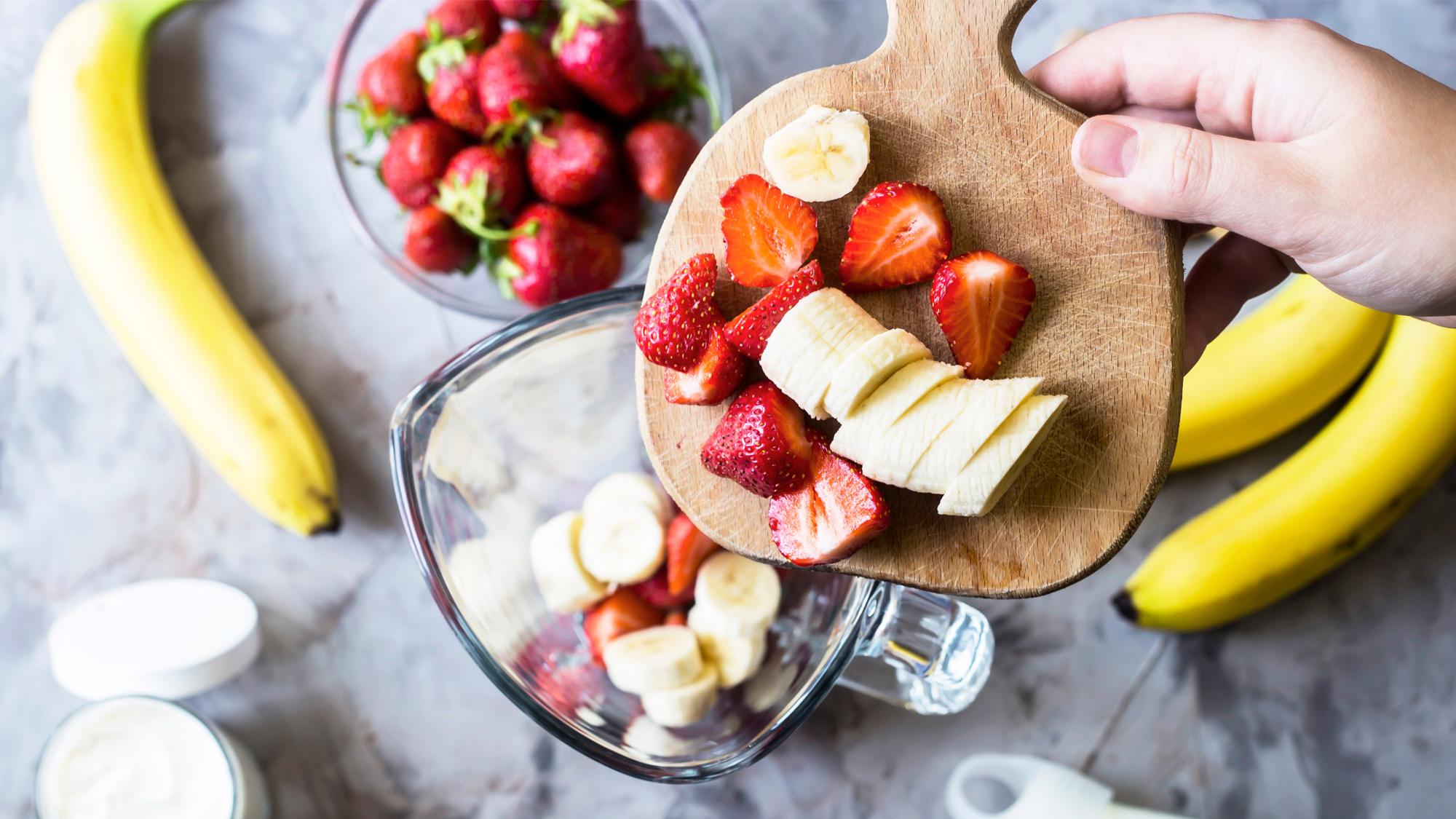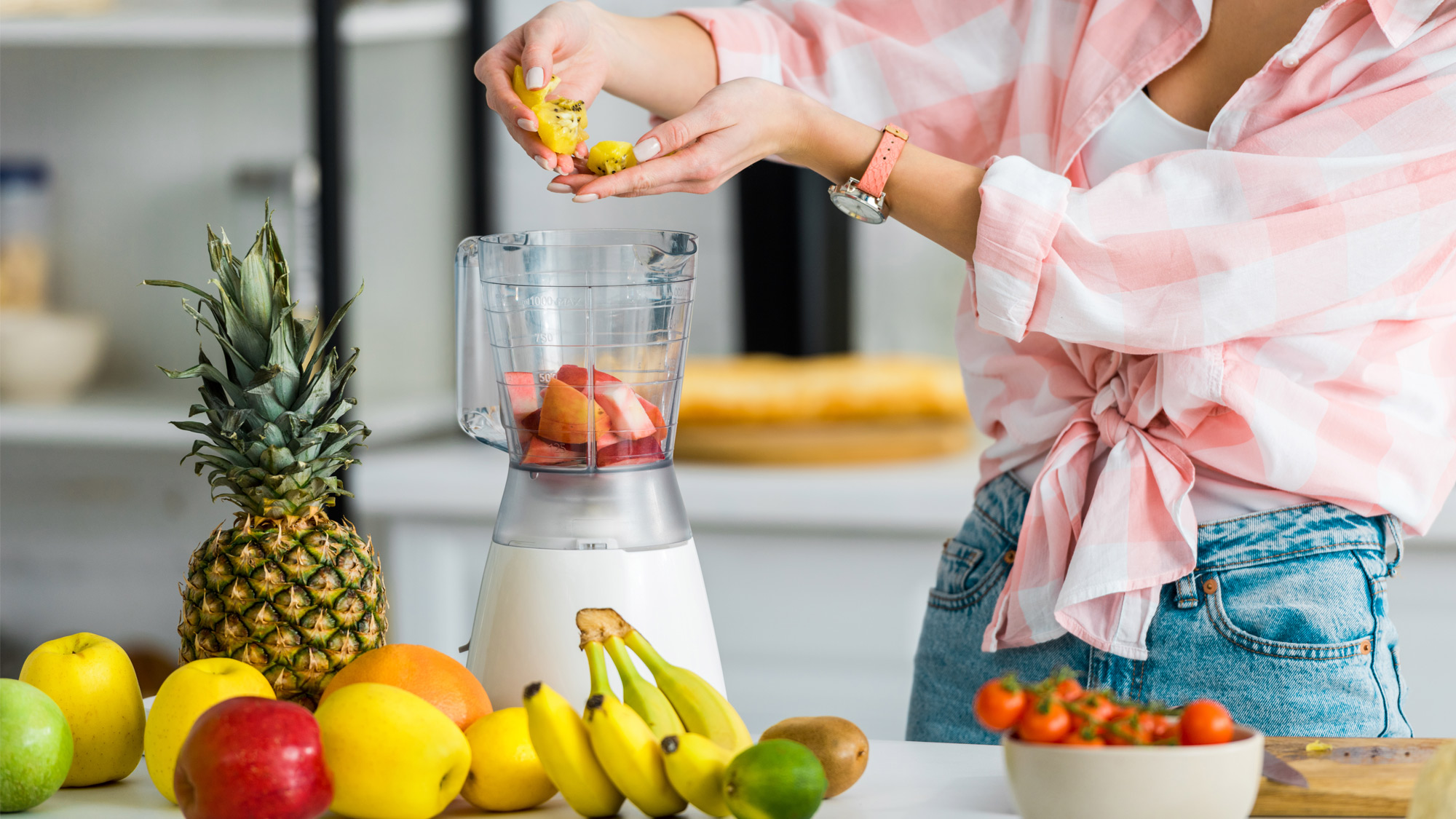Juicers vs blenders: which is best for fresh produce based beverages?
It’s juicers vs blenders as we compare these popular appliances

Sign up for breaking news, reviews, opinion, top tech deals, and more.
You are now subscribed
Your newsletter sign-up was successful
Most of us need to increase the number of fruits and vegetables in our diet and one easy way to do this is by drinking them. Both smoothies and freshly squeezed juices provide a tasty way to enjoy a wide variety of fresh produce. But, if you’re only looking to invest in one appliance, how do you choose between a juicer vs blender?
It depends very much on whether you want a multifunctional appliance, the best blenders can be used for much more than smoothies, they can be used to blitz up smooth sauces, soups, and batters. The smoothies they create are thick and pulpy though, and usually require you to add additional liquid to turn the fruits and vegetables into a drink. On the other hand, the best juicers can extract pure juice from a huge variety of fruits and vegetables, but they can’t do much more.
If you’re reading this, our guess is that you haven’t yet decided whether you want to make smoothies or freshly squeezed juice. Luckily blenders and juicers are quite different in how they function and what they’re capable of. Here we’ll go into detail on the differences in the appliances as well as the differences in the drinks they can create, to help you decide which is best for you.
Juicers vs blenders: Best deals
Already know whether you want a blender or a juicer? Rather than read on and find out the differences between the two types of kitchen appliances, check out the best prices for some of our top models.
Juicers vs blenders: The benefits of juicing
Juicers are available in a few different varieties. A cold press juicer uses force to squeeze the liquid out of whatever you place inside it, whereas a centrifugal juicer uses blades to break down fruits and veggies to create juice in a faster time than a cold press machine.
As you might imagine from the name, the primary function of a juicer is to create juice, and for many, these machines are a must-have kitchen appliance because they allow you to enjoy lots of nutritious food in a quick and easy way. If getting the maximum amount of vitamins is high on your agenda, a cold press juicer is a great option because it squeezes the fruit with force rather than using heat and blades - which can reduce the number of nutrients carried into the juice.
Regardless of how you prepare fresh juice, what you make will still offer a good way to take in lots of vitamins and nutrients without having to chomp down on endless pieces of fruit. If you find you tend to reach for a coffee when you’re feeling sluggish, fresh juice made with greens is a good source of vitamins that help to make you feel more energized.
Sign up for breaking news, reviews, opinion, top tech deals, and more.
Juicers vs blenders: The downside of juicing
The downside to using a juicer is that you’re limited on the types of drinks you can make and there’s also the fact that juicing leaves behind a lot of fruit and veg fibers, which can feel like a waste and you’ll need to dispose of the leftovers too. To create a glass of juice, you’re also using several pieces of fruit which results in a higher level of fructose than if you eat fewer whole pieces of fruit. According the UK’s NHS, eating whole fruit rather than drinking juices is less likely to cause tooth decay “because the sugar is contained within the structure of the fruit.”
Juicers have multiple parts which can make cleaning them very difficult- some parts are not suitable for placing in a dishwasher either.

Juicers vs blenders: The benefits of blenders
Blenders have one up on juicers because they can create so many more things including smoothies and milkshakes, as well as sauces, dips, and baby food. Unlike juicers, blenders break down every part of what you place inside them so that nothing is wasted - this also means you won’t be missing out on any fibers or vitamins that would be chucked out in the waste from juicing machines.
Blenders use spinning blades to break down food quickly and use all of the ingredients to make a smooth liquid that’s normally much thicker than a juice. This means that blenders don’t waste any parts of the fruits and vegetables you use and the nutritious fibers that juicers leave behind, will be a part of your finished mixture.
Blenders often have removable jugs that are suitable for placing in the dishwasher and this makes cleaning them much easier. Juicers have a few different parts and can be more time-consuming to clean. Compared to cold press juicers, blenders are also much quicker at breaking down ingredients and you can sip on a smoothie within a minute - depending on how powerful your blender is.
Because blenders create a thicker consistency using all of the ingredients, there won’t be as high levels of fructose as you’d find with fresh juice.
Juicers vs blenders: The downside of blenders
We know that blenders don’t leave behind any ingredients when you use them to create smoothies or sauces, but by using fast-spinning blades and some heat, blenders can actually reduce the number of nutrients in your mixture.
If you want a blender that can crush ice and break down firm fruits and veggies, you normally have to pay more - which makes buying a blender a pretty expensive purchase.
Both blenders and juicers can be noisy while they are operating and you’ll also need to factor in where you’re going to store these appliances.
Blenders vs juicers: Verdict
Deciding on whether you need a juicer or a blender will depend on what you want to create - if it’s just juice, then a juicer is an obvious choice, but for smoothies, drinks, sauces, dips, and soups, consider a blender.
Juicers will typically create liquids with a higher fructose content because they extract juice from several fruits, rather than blending up a few whole fruits and veggies.
Both juicers and blenders are available across a range of different price points so you’ll be able to find one that suits your needs but be sure to keep in mind the kinds of recipes you’d like to make as this could impact whether you need a more powerful machine or not.
Sophie writes about all things appliance-related and is currently the Home Editor at TechRadar's sister site, Top Ten Reviews. When she's not testing coffee machines and appliances, Sophie is thinking of eating delicious food, and asking people what they're having for dinner.
